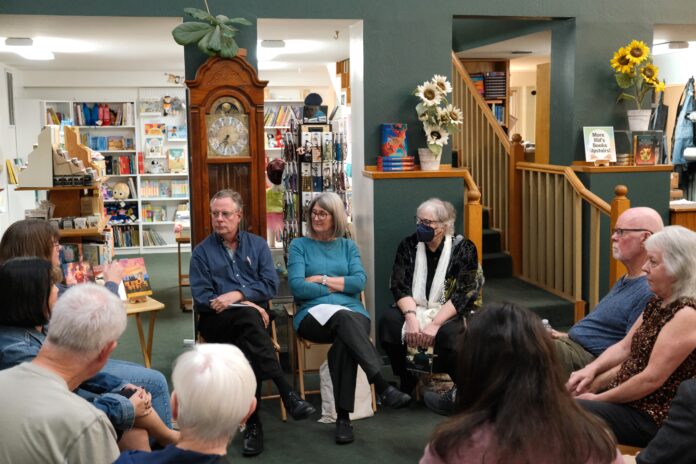Three authors discussed their approaches to writing historical fiction in recognition of California Writers Week
By RORY CONLON — city@theaggie.org
The Avid Reader Bookstore hosted a panel of three historical fiction authors to discuss their books in honor of California Writers Week on Oct. 22.
The authors, which included Tim Schooley, Judith Starkson and Laura Jensen Walker, have written historical fiction novels set as far back as the Bronze Age and as recent as the 1940s. Schooley said that the main aspect tying their books together is the ways in which history connects to the present.
“George Santayana said it best: those who can not remember the past are condemned to repeat it,” Schooley said. “We wanted to talk about that and see how some of these themes resonate throughout history.”
Starkson showcased “Priestess of Ishana (Tesha),” the first book in a series following the journey of a Hittite queen in the Bronze Age. Starkson said she wanted to learn more about Hittite, an empire in the 12th century that stretched across Turkey, Syria and Lebanon, and tell the story of a powerful female ruler that transcended the norms of her time.
“How does an autocratic, patriarchal world have a queen who was famous in her day [for] bossing Ramses the Second around and negotiating a treaty that kept an incredibly disrupted world from breaking into pieces?” Starkson said. “I looked at that mature woman and said, ‘Who were you in the beginning, and how did you get there?’ My series is about her rise to this extraordinary throne.”
Starkson also drew parallels between the queen, Tesha and Kamala Harris, the Democratic presidential nominee.
“Presenting that model of unexpected female leadership to the world in an emotionally engaging, immersive form is my subversive way of persuading people that women can [do it],” Starkson said. “You know that hesitancy some men in America are currently having as they cast their ballots? I’m hoping I’ve soothed some qualms in my readers.”
Schooley’s novel, “The Wool Translator,” also included women who defied tradition. He said that Aisha, a math prodigy in his book, was inspired by his research into the Nasrid Kingdom during the medieval age.
“I found a lot of original sources from the Nasrids talking about these unusual women in their community who were recognized for their brilliance,” Schooley said. “They were allowed a measure of freedom to conduct studies and some of them were considered very important people in their community.”
“The Wool Translator” follows the relationship between Aisha, a Muslim girl, and Newt, a Catholic boy. Schooley names Donald Trump’s “Muslim ban” in 2017 as having inspired his decision to explore religious divides in the novel.
“I started thinking, ‘How would it be possible for me to have a young person in this Muslim kingdom meet a Catholic boy from England?’” Schooley said. “The theme of religious intolerance drove the idea of the story and the plot developed from that.”
Walker’s debut historical fiction novel, “Death of a Flying Nightingale,” is set in England during World War II. The Nightingales were a lesser-known, all-female part of the Royal Air Force that cared for wounded soldiers and shuttled them to safety, according to Walker.
“They went to Normandy the week after D-Day to bring back wounded men from the blood-soaked beaches of Normandy,” Walker said. “They took care of these men on the flights home, and they weren’t allowed to have parachutes because if the plane went down, their job was to stay with the patients. So, every day, two times a day, they risked their lives.”
Walker interviewed the last living Nightingale, who was 106 years old, and included some of her anecdotes in the story. She said the Nightingales showed her how women’s contributions can be overlooked in the past and the present.
“Most of these women became wives and mothers, and that generation didn’t talk about the things they went through,” Walker said. “Many of their children didn’t even know what their mothers had done until 40 years later when they somehow found out about it or mentioned it.”
The authors also discussed reasons why World War II fiction has experienced a resurgence in the 2010s. Starkson said that in a time when people have mixed feelings about conflict, it can be comforting to look back on a time when people were more united.
“I think partly because so much is really problematic these days, we don’t have the mental space to step into fiction where it’s equally problematic,” Starkson said. “We want an escape. It’s reassuring to look back and say, ‘See, people faced a time of great evil, and they responded in a way that was victorious.’”
Written By: Rory Conlon — city@theaggie.org










